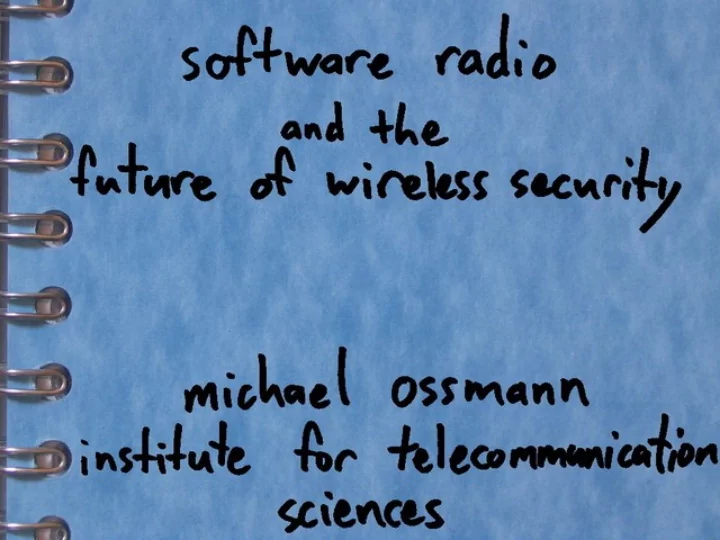

This presentation is an outgrowth of work done under contract to the Institute for Telecommunication Sciences and does not represent the views or policies of the United States federal government.
Mystery Mystery Signal Signal Challenge! Challenge!
C. R. Johnson, Jr. and W. A. Sethares. Telecommunication Breakdown: Concepts of Communication Transmitted via Software- Defined Radio. http://eceserv0.ece.wisc.edu/~sethares/telebreak.html
The GSM Software Project http://wiki.thc.org/gsm
Max Moser and Phill Schrödel. 27Mhz based wireless security insecurities. http://www.remote-exploit.org/advisories.html
Dominic Spill and Andrea Bittau. BlueSniff: Eve meets Alice and Bluetooth. http://www.usenix.org/event/woot07/tech/full_papers/spill/
Henryk Plötz. RFID Hacking. http://events.ccc.de/congress/2006/Fahrplan/events/1576.en.html
olleB. Mobitex Network Security. http://cansecwest.com/csw08/csw08-olleb.pdf http://www.toolcrypt.org/
Daniel Halperin, et al. Pacemakers and Implantable Cardiac Defibrillators: Software Radio Attacks and Zero-Power Defenses. http://www.secure-medicine.org/icd-study/icd-study.pdf
GNU Radio: the gnu software radio. http://gnuradio.org/trac
The Universal Software Radio Peripheral (USRP). http://www.ettus.com/
High Performance Software Defined Radio. http://hpsdr.org/
baudline signal analyzer. http://www.baudline.com/
MATLAB. http://www.mathworks.com/
GNU Octave. http://www.gnu.org/software/octave/
OP25. A software-defined analyzer for APCO P25 signals. http://sedition.org.au/op25
1 Software Radio and the Future of Wireless Security Michael Ossmann Institute for Telecommunication Sciences
This presentation is an outgrowth of work done under contract to the Institute for Telecommunication Sciences and does not represent the views or policies of the United States federal government. 2
3 My name is Michael Ossmann. I work for the Institute for Telecommunication Sciences at the Boulder Labs in Colorado.
4 ITS is part of the National Telecommunications and Information Administration.
5 The NTIA is part of the United States Department of Commerce.
6 I work primarily on public safety wireless communication security, and my work is funded by the Office of Law Enforcement Standards of the National Institute of Standards and Technology.
7 NIST is also part of the Department of Commerce.
8 NIST's funding for my work comes from the Department of Homeland Security's Office for Interoperability and Compatibility.
9 DHS gets its money from these guys
10
11 in the next hour what is software radio? why is software radio taking over the world? what does this mean for the future of wireless security research? demos how can I get started with software radio tools today? (radio for software people)
Recommend
More recommend